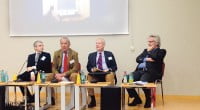Keyword: Hizmet (Gulen) movement

Erdoğan says personally pursuing fight against ‘parallel structure’
President Recep Tayyip Erdoğan acknowledged during a speech on Tuesday that he has personally been pursuing a “fight” against the so-called “parallel structure,” adding that his administration is ready to cooperate with district governors to “clear” its members from state bureaucracy.

‘Hizmet’s solution against radicalism should be announced to world’
At a time when the faith-based Gülen movement, also known as the Hizmetmovement, is under heavy government pressure in Turkey, Lord Maclennan of Rogart, academics and scholars have praised the movement at a panel at the House of Lords for its efforts against the spread of radical Islamism and violence across the world.

The Gülen movement as the victim of an orchestrated smear campaign
When the Justice and Development Party (AKP) took office in 2002 under the leadership of Recep Tayyip Erdoğan, the party’s commitment to democratization was promising. As many political scientists agreed, the first years of AKP rule were a success story, and that was why, with its secular multi-party democracy and its Muslim character, Turkey had emerged as a role model for the Muslim world.

Al-Azhar professor: Gülen courageously resists radicalism
Turkish Islamic scholar Fethullah Gülen teaches real Islam to the world while bravely resisting the destruction of the religion by radical and barbaric Muslims, a world-renowned professor at Egypt’s al-Azhar University said during an interview on Wednesday.

CHP: Anti-Hizmet ops were part of agreement between Erdoğan, military
Main opposition Republican People’s Democratic Party (CHP) İstanbul deputy Barış Yarkadaş has said the release of suspects in the historic Ergenekon trial and the government-initiated operations against the Hizmet movement were part of an agreement between President Recep Tayyip Erdoğan and the Turkish military.

Former deputy Uras: Erdoğan struck deal with Ergenekon against Gülen movement
A former member of Parliament, academic Ufuk Uras claimed during an interview with a daily on Monday that President Recep Tayyip Erdoğan had made a deal with the leaders of the Ergenekon clandestine organization during his fight against the faith-based Gülen movement after the Dec. 17 and 25 graft investigations became public at the end of 2013.

Intellectuals from West, East agree Gülen movement works for a better world
At a time when the faith-based Gülen movement is under heavy government pressure in Turkey, intellectuals from various countries have praised the movement for its efforts to make the world a better place for everyone by promoting education, peace, benevolence through dedication.

The Hizmet movement, social democracy, the religious left
The organizers announced that the conference would on the first day focus on “the Hizmet movement, inspired by the Turkish preacher Fethullah Gülen, which is portrayed by many as an example of modern, ‘enlightened’ Islam, oriented towards dialogue and co-operation rather than conflict.

Erdoğan is helping Hizmet community in three ways
If President Recep Tayyip Erdoğan had given an assurance to the world, saying, “The Hizmet movement never resorts to violence and it is an antidote to Islamist violence,” people would still have nurtured doubts and they still would have asked if they, like Islamists, would resort to violence under duress.

A Turkish Recluse Bridges the Western and Muslim Worlds
A free global and interconnected citizenship might be the pathway to foster a non-violent and peaceful culture within societies. This is the main objective of a grassroots movement that advocates enhancing education, promoting universal values, interfaith dialogue and democracy.

Fethullah Gülen on Acts of Terrorism – in light of Paris and Beirut
Gülen’s position on violent extremism is based on a comprehensive, thorough and robust understanding and reading of the spirit and teachings of Islam’s primary sources, the Qur’an and Sunna – the same foundations on which its core teachings are based.

African Union Commission chair supports creation of more Turkish schools
Nkosazana Dlamini-Zuma, the chairperson of the African Union (AU) Commission, said on Tuesday during a visit to Johannesburg that volunteers working for the faith-based Gülen movement — inspired by the teachings of Turkish Islamic scholar Fethullah Gülen — should continue to build schools and other institutions in Africa.

Gülen movement can serve as bridge between Islamic and secular nations, intellectuals agree
Amid ongoing efforts by the Turkish government to close down schools opened by Turkish entrepreneurs linked to the faith-based Gülen movement, also known as the Hizmet movement, intellectuals and academics across Europe at a symposium in Germany agreed that thanks to its worldwide educational activities, the movement can serve as a bridge in promoting interreligious and interethnic dialogue between Islamic countries and secular ones.



















